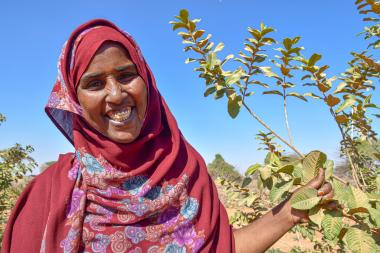East Africa Food Crisis: Ceel-Hume

East Africa is experiencing one of the most severe droughts on record and is facing its worst food crisis for decades, following four years of failed harvests, erratic rainfall and rocketing global food prices. In Ceel-Hume, severe lack of water put a slow and rough end to pastoralism, forcing many in the community to seek alternative livelihoods.
In July 2018, ActionAid established a community farm in partnership with the Ceel-Hume women’s group, the World Food Program, and local government. The community envisioned this project after the drought took their pastoral livelihood away from them and welcomed the support of ActionAid, especially the seeds and technical support from local agronomists. Habiiba, a farmer, shared that other local communities have started asking how to start their own community farms after witnessing the success of the abundant onion, papaya, tomato, guava, banana, and lettuce harvests.
Saynab's story:
Saynab is the chairperson for the Ceel-Hume women’s group, managing the community co-op and supporting daily farm tasks. She shared that before the partnership with ActionAid, the community wasn’t sure how to adapt after they lost their livestock to the drought.
"The drought affected our livelihood; we lost our livestock and migrated here. Then ActionAid collaborated with other NGOs here and they said since our other livelihood was lost, we will create together an alternative livelihood income, so now we are farming.
Now we are going to display our strengths. We are calling all the women in the communities to the center of the village to show off that we have very strong women and a lot of capacity. Now we have enough experience in agriculture and farming to share the capacity we have. We want to teach others who don’t have experience. We teach them, we mobilize them. We emphasize and encourage building capacity.”

Working with ActionAid’s technical experts and local agronomists has also strengthened the group's capacity to keep their crops safe and healthy, especially as a changing climate brings different types of pests.
The women sell the cash crops and milk collected from pastoralists at the market in Burao in addition to selling at the local co-op in the heart of the Ceel-Hume community. Run by the women’s group, this co-op is both a processing center for value-add products, such as mango juice, as well as a weekly market and a place for community members to charge their electronics. In this space, women are able to reclaim their power in decision-making and build their own economic security.
The women manage the co-op and switch shifts daily: some work in the morning and some in the evening while alternating between working in the fields. They started the business in 2015 and hope to extend their learning to other local women.
Halwo's story:
For Halwo, a farmer in Ceel-Hume, drought is not only interrupting the growing seasons because of the extreme heat and lack of water, it has also brought pests, diseases and brave wild animals. Since the animals are also experiencing food scarcity, Halwo has started using traditional fencing to keep them from eating the cash crops. Though she is able to continue farming, the reality is she doesn’t have enough food to be stolen.
“I grow my own farm and I learned about the useful plants [from ActionAid]. Today, I can show others that I have learned. I know which farm wants to be sprayed and the one that doesn't need it. I lead many people with my knowledge and give advice... [But] drought has led to water shortages.”

The women in Ceel-Hume have noticed the devastating impact of climate change on the land and the community year after year, especially the lack of water which has an impact on their general well-being and their daily tasks. But by knowing how to adapt and farm in extremely difficult situations, women in this community are able to feed their families food from their land rather than travel long distances in search of it.
Habiiba's story
The drought hit Habiiba, who used to be a nomadic pastoralist, especially hard. She only has about 30 of the 70 goats she used to herd and hasn’t been able to make a living from them.
But with the support of ActionAid and the World Food Program, farming cash crops is saving her life and nourishing the community around her. Now that Habiiba has income from the sale of crops, she can support herself and her family, including paying for her son to study at a university in Jigjiga, located in the Somali region of Ethiopia.
“The [produce we grow] includes olives, mangos, oranges, lemons, bananas, tomatoes, onions, peppers and chili pepper. Things have changed a lot, and my family's life has improved. I was able to pay for the children's education, bought food, dug a well, and bought a [water pump] machine. My life has changed dramatically.”

Read about other communities living through the East Africa Food Crisis:


